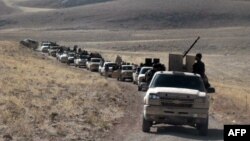A Syrian rebel commander who recently completed a U.S. training program has told the Pentagon that he surrendered six coalition-provided trucks and ammunition to militants from the al-Qaida affiliate in Syria, known as the al-Nusra Front.
U.S. Central Command says roughly 25 percent of the equipment assigned to that unit was apparently turned over earlier this week in exchange for safe passage within the region.
After earlier denying reports that some fighters had handed over gear, the Pentagon acknowledged Friday that it had received notification from the New Syrian Forces (NSF) unit.
"If accurate, the report of NSF members providing equipment to al-Nusra Front is very concerning and a violation of Syria train-and-equip program guidelines," U.S. Central Command spokesman Colonel Patrick Ryder said.
Earlier this week, the al-Nusra Front tweeted an image of a coalition-issued rifle and claimed that the newest NSF members had handed over all their weapons upon re-entering Syria last week.
At the time, the Pentagon said the image was an old picture repurposed from the Facebook page of a previously deployed NSF fighter from a different training class.
But Friday, Ryder said, "in light of this new information, we wanted to ensure the public was informed as quickly as possible about the facts as we know them at this time."
Troubled program
Meanwhile, two senators are asking Defense Secretary Ash Carter to brief them on the administration's review of the Syrian train-and-equip effort.
Republican Deb Fischer of Nebraska and Democrat Claire McCaskill of Missouri sent a letter as the train-and-equip program comes under increasing congressional scrutiny.
American lawmakers have fumed at its slow pace, and in July, President Barack Obama voiced his frustration with the program, saying, “I have made it clear to my team that we will do more to train and equip the moderate opposition in Syria.”
In July, al-Nusra abducted a commander and seven fighters from the program’s first graduates just days after they had deployed in Syria, following training in Turkey. The unraveling of the first contingent prompted an outcry on Capitol Hill, and last week senior administration officials defended the program before skeptical lawmakers.
General Lloyd Austin, chief of U.S. Central Command, told the Senate Armed Services Committee that no more than five U.S.-trained Syrian fighters were left from the initial graduates — an acknowledgment that the $500 million program to raise an army of Syrian fighters had gone nowhere. He acknowledged the program might be overhauled.
Laying blame
Syrian rebel commanders, who have been loath to volunteer men for the program, say the two biggest problems with the mission are how tightly Washington defines “moderate” and the Obama administration’s insistence that the train-and-equip force can be used only against Islamic State extremists and not against the Syrian president, Bashar al-Assad.
The rebel fighters say Assad is responsible for many more deaths in Syria than the jihadists. “I told them from the start I wouldn’t offer one man as long as the force was only going after Daesh,” a rebel commander using the Arab acronym for IS told VOA. He said he could see no purpose in weakening his forces, who are mainly fighting Assad’s army, to take on the Islamic State group.
The al-Nusra Front, a rival to the Islamic State group, has targeted U.S.-backed rebels in Syria. Last year, it routed two rebel militias, the Syria Revolutionaries Front and the Hazzm Movement.
VOA's Jamie Dettmer contributed to this report.





